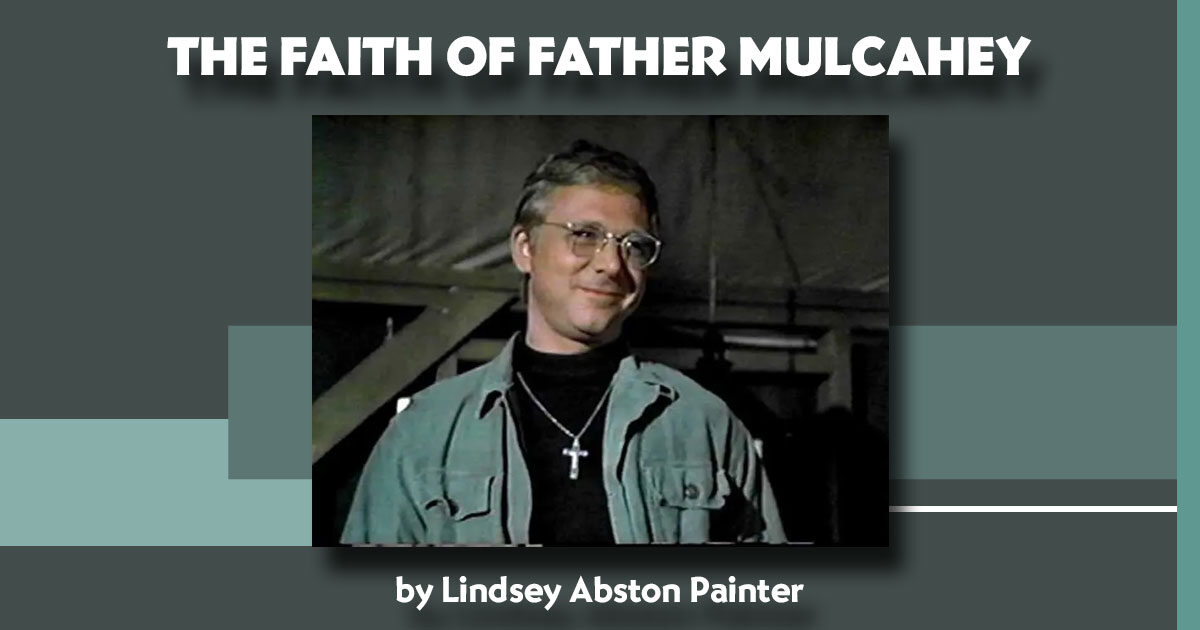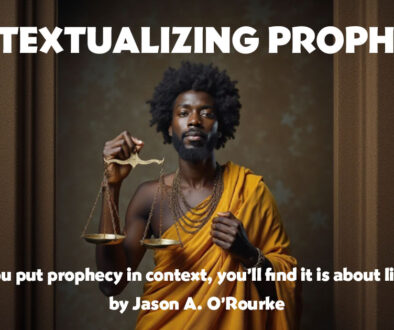The Faith of Father Mulcahy
by Lindsey Abston Painter | 10 June 2025 |
I’m watching M*A*S*H for the first time. I know I’m late to the party—I was born in the ’80s, so I missed M*A*S*H in its heyday. It’s still funny and brilliant, at the same time fun and deeply moving.
The character that has consistently drawn my admiration and attention is Father Mulcahy (played by William Christopher).
In case you’ve been living under a rock like me and haven’t seen the show, M*A*S*H is about a medical unit during the Korean War. Most of the characters on the show were conscripted, and they don’t want to be there. Their living conditions are appalling. They call the type of medicine they practice “meatball surgery” because it happens under primitive conditions, enormous time pressure, and sometimes while actively under attack.
A dedicated clergyman
Father Mulcahy is the chaplain of the unit. And boy, does he have his work cut out for him! The people serving in his unit are traumatized, angry, bored, cynical, and exhausted all the time.
But the thing that makes Father Mulcahy stand out is his dedication to the core of his faith. He is a humble man. He gets frustrated, makes mistakes, loses his cool, like any person. But he is always trying to live out his faith, even under extraordinary circumstances.
Unlike some clergy, Father Mulcahy is nonjudgmental toward those around him. In the M*A*S*H unit there is a lot of drinking, gambling, and cheating on spouses back home. People lose their cool, they make stupid decisions, they hurt one another. Father Mulcahy doesn’t participate in the drinking, gambling, or sex, but neither does he piously separate himself from his peers. He is there, playing cards, hanging out in the officers’ club, and generally being a good guy. He doesn’t evangelize; he leads by example. He’s a good sport too, reminding those around him that a sense of humor is a gift from God.
He does everything he can to contribute to the spiritual and emotional well-being of the staff, and the soldiers who come to the unit to be healed. He even does relief work for the local Korean villagers.
There is an episode where an important Catholic cardinal is scheduled to come to the M*A*S*H unit. Father Mulcahy is in a tizzy trying to get his army buddies to put their best foot forward while someone so important is visiting—especially someone so important to his own career.
But the night before he is scheduled to hold a special service to honor the cardinal, a soldier receives a diagnosis of leukemia. Father Mulcahy stays up all night talking to the soldier, helping him work through his feelings. The next morning he shows up late to the cardinal’s service, in his bathrobe, unshaven, and gives an impromptu but emotional—and very personal—sermon about realizing where his priorities should be, and being grateful for each day. He chooses empathy over personal gain and reputation.
Living your faith
That is characteristic of Father Mulcahy. He lives his faith daily, hourly, in a war zone, doing his work alone. It is not the extraordinary superhero acts that make him remarkable, but rather the mundane everyday choices of sacrifice, empathy, and love.
Paul writes to the Colossians (3:12),
“Therefore, as God’s chosen people, holy and dearly loved, clothe yourselves with compassion, kindness, humility, gentleness, and patience.”
It appears that God’s plan for his people is more in line with Father Mulcahy’s example than some of the Christian leaders we see today.
I have been frustrated by the direction of the Christian church—that is no secret. Christianity has become unrecognizable to me. It prioritizes power and money, flash and dazzle, over substance. Christianity has aligned itself with politics in an unholy way for the pursuit of fame, glory, money, and power. I wonder if that temptation is what Paul had in mind when he counseled in Philippians 2:3-5,
“Do nothing out of selfish ambition or vain conceit. Rather, in humility value others above yourselves, not looking to your own interests but each of you to the interests of the others.”
But that is not the faith of Father Mulcahy. His Christianity is the kind of Christianity I can appreciate: humble; servicing; not seeking glory, fame, or money.
Father Mulcahy often feels that his contribution makes no difference, that it is insignificant compared to the doctors he works with who save people’s lives—what someone has labeled “the imposter syndrome.” Yet he continues to minister in his quiet, unassuming way to anyone and everyone who crosses his path, a candle shining in the piercing darkness of war.
Did he make a difference? Maybe it didn’t change the course of the war, but to the hundreds of people he ministers to, it did.
Darkness around us
Though I don’t live in the midst of a foreign war, I too find myself bewildered by the darkness surrounding me. People keep referring to our current circumstances as “unprecedented times,” but it all just feels dark and foreboding to me.
Watching Father Mulcahy struggle against the darkness, consistently choosing light, empathy, and hope inspires me.
I work in a school inside of a juvenile hall. The young people I work with have experienced more darkness than I can even imagine. Society judges them for their bad choices—and they have made some stunningly bad choices.
But they are also kids who have been abused, neglected, and abandoned by those who were supposed to love and protect them. I can’t save them. I can’t change the course of their lives. I can’t fix the ugly circumstances that landed them here. But I can be a candle in the dark.
And not just for them. I strive to be a candle to my family, to my friends, to my coworkers, to the lady in the checkout line in the grocery store.
I can’t stop the darkness; I can’t change national or world politics. I can’t make evil people stop being evil. But I can refuse to buckle to the darkness. I can make those same mundane, everyday choices of sacrifice, empathy, and love.
 Lindsey Abston Painter is a teacher, and is also part of the Adventist Today editorial team.
Lindsey Abston Painter is a teacher, and is also part of the Adventist Today editorial team.




